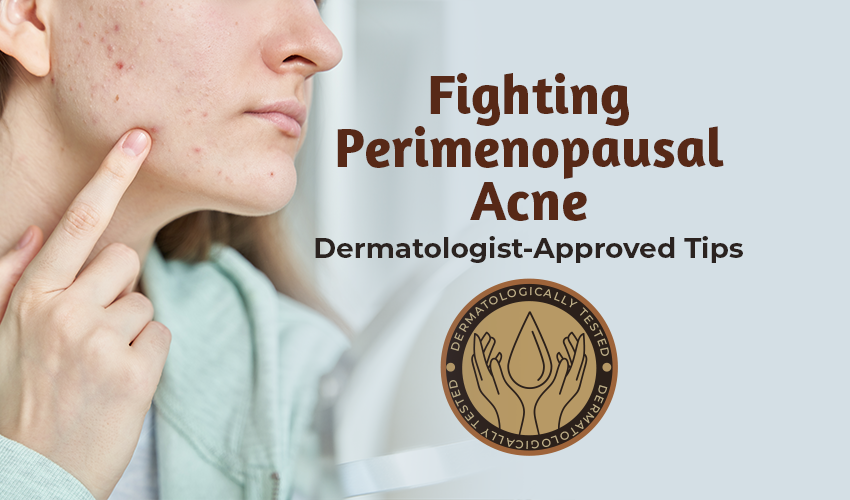Managing Perimenopause Acne: The Uninvited Guest
Managing Perimenopause acne is a transitional phase in women’s lives with a myriad of changes, among which perimenopause acne is the one that often goes unnoticed.
As our bodies transition into this stage, hormonal fluctuations trigger unwelcome skin issues, including acne.
While acne skin condition is typically associated with adolescence, it may rear its head once again during perimenopause. So, if you’re dealing with this uninvited guest, rest assured that you’re not alone.
Understanding Perimenopause Acne
Perimenopause, the transitional time before menopause, usually occurs in the late 40s or early 50s. Hormonal changes during this time, particularly a decrease in estrogen and progesterone, can lead to imbalances in androgens, the male hormones present in both men and women.
These imbalances can overstimulate the sebaceous glands to secrete more oil, making your skin more acne-prone.
Dermatologist-approved Tips for Managing Perimenopause Acne
- Skincare regimen: A consistent skincare routine is your first line of defense against perimenopause acne. Choose gentle, non-comedogenic products that won’t clog your pores. Incorporate a daily cleanser, a mild exfoliant, and a moisturizer into your regimen.
- Prescription medicines: Dermatologists usually prescribe options such as antibiotics, topical retinoids, or birth control pills, and spironolactone.
These are used as hormonal therapies to regulate levels and reduce acne.
- Lifestyle changes: Maintain a healthy lifestyle to keep acne in check. Eating a balanced diet, staying hydrated, and getting regular exercise can help manage hormonal fluctuations.
- Managing stress: High stress levels can exacerbate perimenopause acne. Try stress-reducing practices like meditation, yoga, or deep breathing exercises to relax.
- Avoid trigger foods: Certain foods can cause your acne to flare up. Be mindful of your diet, and if you can identify triggers, consider eliminating those foods altogether.
- Sun protection: Sunscreen is essential to prevent skin damage and pigmentation changes that can result from acne. Use a broad-spectrum SPF and apply it daily.
- Consult a dermatologist: It’s important to seek professional guidance if perimenopause acne persists to affect your skin.
Dermatologists can offer personalized treatment plans and recommend procedures like laser therapy or chemical peels.
Perimenopause acne can be frustrating, but with the right skincare routine, lifestyle modifications, and professional help, you can manage and minimize its impact on your life.
Remember, every person’s skin is unique, so don’t be afraid to consult a dermatologist for personalized advice and treatment options tailored to your specific needs.
Conclusion
perimenopause acne is a common but often overlooked aspect of the perimenopausal journey. By taking control of your skincare routine and seeking professional guidance, you can restore confidence in your skin’s health and appearance. So, don’t let perimenopause acne diminish your glow – take charge and welcome this stage of life with confidence.











